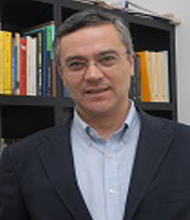Inaugural address
Inaugural address Javier Couso – May 2015

On 18 May 2015 Her Royal Highness Queen Máxima attended Javier Couso’s inaugural address
‘The observance of human rights requires an independent justice system’
Who protects the people of Latin America against the government? This is the key question in Professor Javier Couso’s inaugural address which he will be holding at Utrecht University on 18 May. In his address, Couso argues that without the structural support of a fully independent judicial system, human rights will continue to be systematically abused, even in democracies. The 43 missing students from Iguala, Mexico serve as an example.
Lack of the rule of law
In his address, Couso emphasises an essential aspect of upholding human rights which is frequently taken for granted: an independent justice system. Couso takes as an example the contrast presented by Latin American countries with, on the one hand, democracy with universal suffrage and, on the other, the lack of an independent judiciary, resulting in governments that do not abide by the law (lack of the rule of law). He asks the question how this situation could have come about.
Missing Mexican students
A recent example of what can happen in a democracy without the rule of law is Mexico, where 43 students disappeared in Iguala in September 2014. In all likelihood they were murdered. And though it was initially assumed that they, like hundreds of thousands of others in recent years, were the victims of the drug cartels, it soon became clear that the local authorities were also involved in the murders.
Non-autonomous law courts
And Mexico is no exception: many Latin American countries, also following the return to democracy, have failed in restraining their police forces from killing thousands of their own citizens. The failure of non-autonomous law courts to punish perpetrators is an important reason why these abuses continue. Couso emphasises that the same is true of other regions, and not only Latin America.
Democracy alone is not enough
Couso observes that while the rule of law and the associated judicial independence are essential for a more humane and just world, they are far more difficult to establish than democratic elections. Without the steadfast support of a fully independent justice system, human rights will continue to be systematically abused, even in democracies. The defence of human rights should not however need to be ‘outsourced’ to international courts of justice, but rather protected by independent national courts.
About Javier Couso
Javier Couso is professor at and director of the Constitutional Law Program of Universidad Diego Portales in Santiago (Chile). He was appointed to this special chair effective 1 September 2014. Over the next two years he will join scholars affiliated with Utrecht University’s strategic theme Institutions in conducting comparative law research. Couso is being hosted by the Netherlands Institute of Human Rights (SIM).
Couso is specialised in the field of legal sociology and comparative law, with a special focus on constitutional matters in Latin American countries, such as Chile, Mexico, Nicaragua and Peru. His lines of research include judicial independence and human rights. Chilean president Michelle Bachelet recently appointed him member of the advisory board which is tasked with evaluating Chile’s anti-terrorism legislation. Couso’s research is consequently largely dedicated to better understanding the often difficult transition processes in Latin America.
Inaugural address
Title: Sine qua non: On the role of judicial independence for the protection of human rights in Latin America